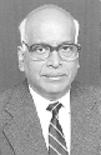Asuri Sridharan
For his outstanding and continued contributions to graduate research and education in civil engineering, the Schools of Engineering are proud to present the Distinguished Engineering Alumnus Award to Asuri Sridharan.
Deputy Director and Professor of Civil Engineering,
Indian Institute of Science
PhD 1968

On choosing civil engineering and Purdue
In the days after independence in India, civil engineering was given maximum importance. Nehru was the prime minister, and he immediately started many projects like large dams and industries, which attracted a number of civil engineers to the profession. All the best students in those days would select civil engineering as a career, and I was one of them. It so happened that engineering was an optional subject in my school, so I actually started studying a subject called "engineering science" in eighth grade, when I was 13 years old.
When I began considering PhD programs, Professor Leonards, the head of Purdue's School of Civil Engineering, was well-known-he was an authority in soil mechanics. By then I had five years of research and teaching experience at the Institute of Science, specializing in soil mechanics. I wrote to Professor Leonards and got a reply saying my curriculum vitae was satisfactory and he would offer me a fellowship, and I could join the PhD program. I also tried MIT, Harvard, and Detroit, but from those schools I didn't receive a reply until 10 days later. Professor Leonards had already guided two Indian students, both from Bangalore. His immediate offer attracted me, and I came to Purdue.
On Purdue memories
I wanted to finish my PhD successfully in three years and to pass my comprehensive exam in the first attempt. When I arrived at Purdue and quite innocently remarked that I would finish in three years, I got a lot of condescending smiles that only made me work harder and achieve my goals successfully.
What I remember most was the galaxy of very talented professors in my area. Professor Altschaeffl, who was my supervisor and a most capable man, Professor Leonards, Professor Haar and Professor Lovell, Professor Yoder and Professor Low-they were all great in their own right. Because of my previous experience, I was not asked to take all the courses. My adviser said 11 courses would be sufficient, but I took 16, primarily to listen and learn more from the professors and the organized way in which their courses were conducted. In fact, once not long ago I told Professor Altschaeffl that I would like to come to Purdue for another PhD just to enjoy and learn from the organized coursework. The devotion and sincerity of the professors and the logical and analytical way of looking at problems impressed me very much. When I came out of Purdue, I was truly a solid man.
On educational systems and teaching
At Purdue I recognized that Indian students, intelligence-wise, were comparable to any students in the world. But between the British system [used in India] and the American system, there was no doubt that with regard to the coursework, the American system was superior. Indian students were not given an organized education. This always bothered me. I felt that when I returned to India, I should concentrate on improving the quality and organization of teaching.
Our institute has a policy that no faculty member should be doing only administrative work, but that everyone should be teaching and doing research. It is a good policy. A good researcher should also teach. One cannot be a good researcher without also teaching students. In fact, I have learned many things from students' questions. There have been many research problems I have solved because the students have asked intelligent questions. Teaching very bright students in higher education is itself an education, which is why I never want to leave teaching.
On engineering education
The most important part of one's university engineering education is the field-oriented part. These days there has been a change to computer-oriented education. The computer is important; there is no doubt about it. But one should not lose arithmetic because we have calculators. One should have a feel for the subject, a feel for numbers, a feel for the problems. I am a little worried that we are losing that edge. Good engineering education requires that field-oriented knowledge.
I see Purdue engineering education's future as addressing the practical needs of world society and the economy by adapting ahead of time to priorities and challenges facing nations at large. I also look forward to Purdue identifying new thrust areas before other universities and reaching greater heights than ever before.
- 1994:
- Deputy Director, Indian Institute of Science (Bangalore, India).
- 1987-1994:
- Chairman, Mechanical Sciences Division.
- 1984-1987:
- Chairman, Department of Civil Engineering.
- 1982-present:
- Professor of Civil Engineering.
- 1975-1977:
- Alexander Von Humboldt Fellow and visiting professor, University of Karlsruhe (Germany).
- 1977-1982:
- Associate Professor of Civil Engineering, Indian Institute of Science.
- 1969-1977:
- Assistant Professor of Civil Engineering.
- 1962-1969:
- Lecturer, Department of Civil Engineering.
BE 1959, Sri Venkateshwara University; ME 1960, Indian Institute of Science; PhD 1968, Purdue; DSc 1993, Indian Institute of Science.
